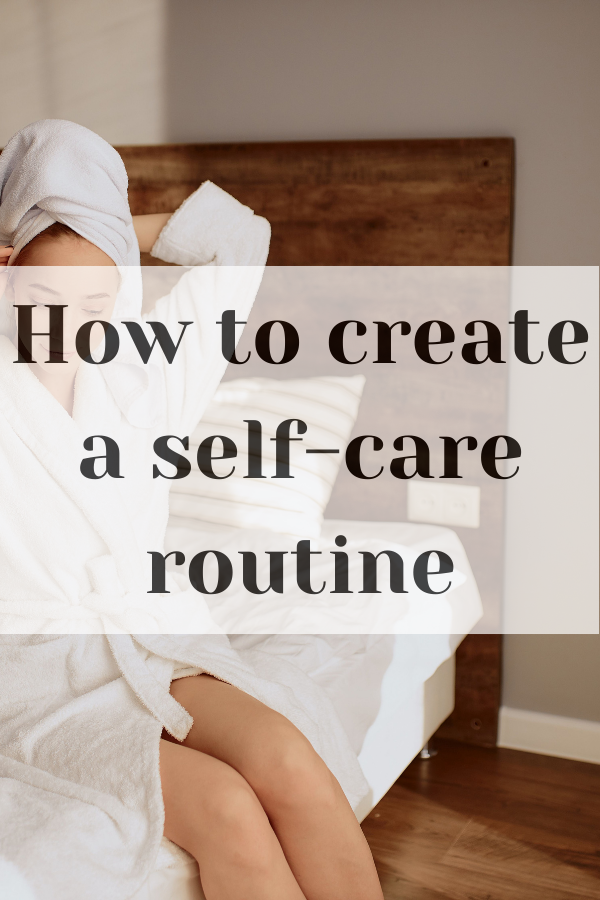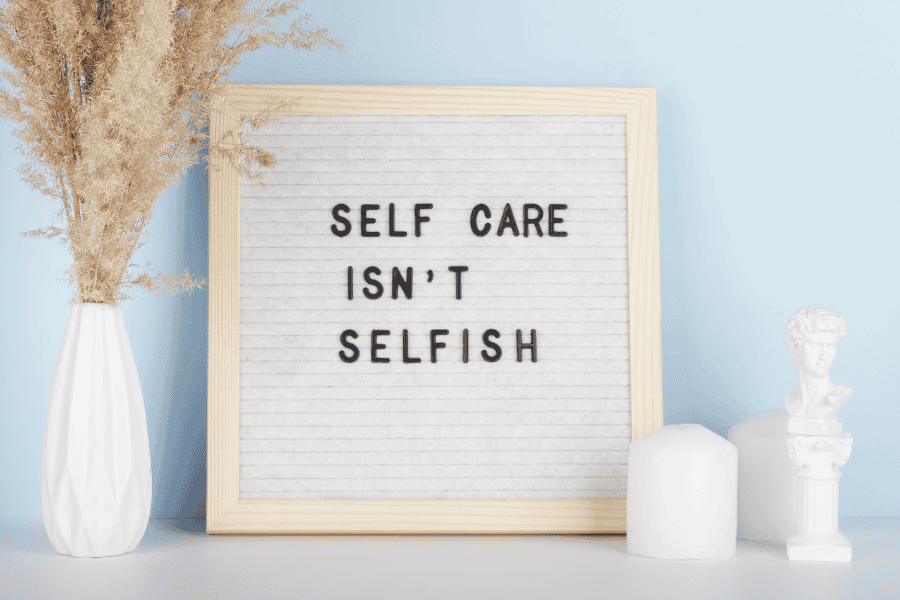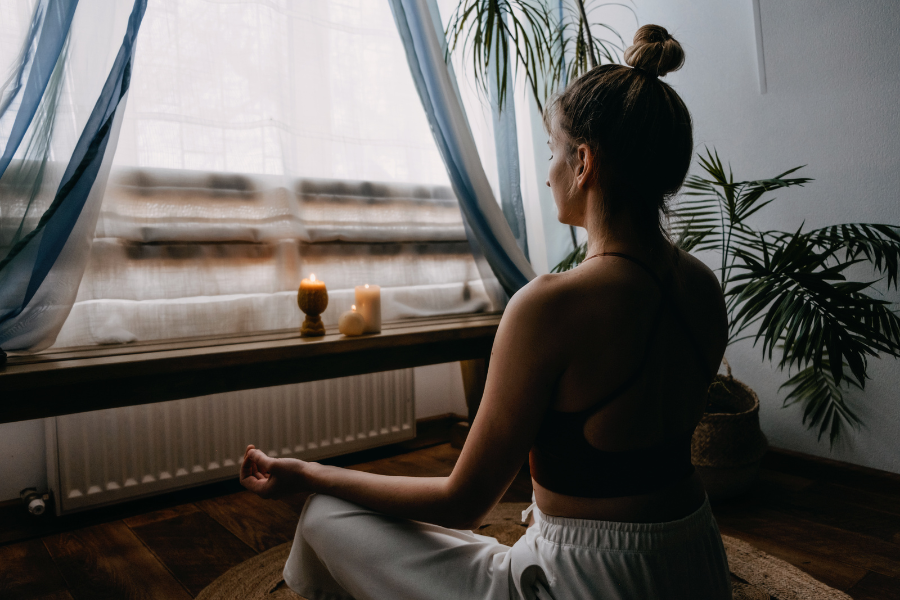How to create a self-care routine

Learning how to create a self-care routine should be your top priority if you’re feeling overwhelmed and burnt out. I know what you’re thinking, you barely have time to create a plan, let alone implement one! Well, this post may help you.
It’s important to prioritise your self-care routine for a number of reasons, but most of all, you deserve a bit of time to yourself!
This post is about how to create a self-care routine

Importance of self-care
Self-care is essential for overall well-being because it helps us to take care of our physical, emotional and mental health. When we neglect self-care, we become more susceptible to stress, anxiety, burnout and other negative consequences that can impact our daily lives.
Here are some reasons why learning how to create a self-care routine is so important:
Reduces stress
Self-care activities, such as meditation, yoga and deep breathing can help reduce stress and anxiety. When we’re stressed, our body releases hormones like cortisol, which can have negative effects on our health over time. Self-care can help lower cortisol levels and promote relaxation.
Boots mood
Self-care activities like exercise, spending time in nature and socialising can help boost our mood and improve our overall outlook on life. By taking care of ourselves, we can reduce negative emotions and increase feelings of positivity.
Improves physical health
Regular exercise, healthy eating and getting enough sleep are all important components of self-care that can help improve our physical health. By taking care of our bodies, we can reduce our risk of chronic diseases and increase our energy levels.
Enhances productivity
When we’re stressed and overwhelmed, we’re less productive and more prone to making mistakes. Self-care can help us recharge our batteries and improve our focus, making us more productive in our daily lives.
Promotes self-love
Practising self-care is a way of showing ourselves love and compassion. By taking care of ourselves we can improve our self-esteem and increase our overall sense of self-worth.
Self-care is important because it helps us to reduce stress, boost our mood, improve our physical health, enhance our productivity and promote self-love. By making self-care a priority in our lives, we can improve our overall well-being and lead happier, healthier lives.
Common barriers for self-care
Here are some common barriers to self-care that most people often face:
Lack of time
Many people feel like they don’t have enough time for self-care activities, especially if you have busy schedules or a demanding job. You may feel like you’re just too busy to take care of yourself, which can lead to neglecting your own needs.
Feeling guilty
You may feel guilty about taking time for yourself, especially if you feel like you should be focusing on other responsibilities or taking care of others. You may view self-care as selfish or feel as though you don’t deserve to take time for yourself.
Lack of resources
You may also not have the resources, such as money or access to transport to engage in certain types of self-care activities. This can then make it difficult to prioritise self-care.
Lack of knowledge
You may also not know where to start with self-care, or you may not be aware of the benefits. You may not understand how self-care can help manage stress or improver your overall well-being.
Fear of judgment
You might be afraid of being judged by others if you engage in certain types of self-care activities. For example, you may worry that others will view you as lazy or selfish if you take time off work to relax or engage in leisure activities.
It’s important to acknowledge that these barriers are real and can be difficult to overcome. However, it’s also important to recognise that creating a self-care routine is not selfish or indulgent, but rather an important part of maintaining your physical, emotional and mental health. By finding ways to overcome these barriers, we can prioritise self-care in our lives and reap the benefits that come with taking care of ourselves.
Identify your personal needs
Identifying your personal needs is a crucial part of developing a self-care routine because it helps you to understand what activities and practices will be most effective in promoting your own well-being. Here are some steps to help you identify your personal needs:
Reflect on your current lifestyle
Take some time to reflect on your daily routine and identify areas where you feel stressed or overwhelmed. Think about what activities or situations drain your energy and which ones bring you joy and fulfilment.
Consider your physical and emotional health
Pay attention to your physical and emotional health and identify areas where you feel like you could use more support. For example, you may need to get more sleep, eat healthier or find ways to manage stress.
Think about your values and interests
Consider your personal values and interests and think about how you can incorporate them into your self-care routine. For example, if you enjoy being outdoors, you may want to prioritise activities like hiking or gardening.
Be open to trying new things
Don’t be afraid to try new activities or practices as part of your self-care routine. You may be surprised by what you enjoy and find effective in promoting your well-being.
Seek support
Consider seeking support from friends, family members or a mental health professional to help you identify your personal needs and develop a self-care routine that works for you.
Remember that everyone’s needs are different, so it’s important to take the time to identify what works best for you. By prioritising your own needs and developing a self-care routine that supports your well-being, you can improve your overall quality of life and reduce the negative effects of stress and burnout.

Creating a self-care routine
Creating a self-care routine can be a powerful tool for prioritising your well-being and ensuring that you are taking regular steps to care for yourself.
Here are some steps to help you create a self-care routine:
Identify your self-care goals
Begin by identifying your goals for self-care. This might include improving your physical health, reducing stress or increasing your overall well-being.
Make a list of self-care activities
Next, make a list of self-care activities that align with your goals. This might include things like exercise, meditation, spending time with loved ones, or engaging in a creative hobby.
Prioritise your activities
Once you have a list of self-care activities, prioritise them based on what is most important to you and what you feel will have the greatest impact on your well-being.
Schedule your self-care activities
It’s important to make self-care a priority in your daily life. Schedule your self-care activities into your calendar, just like you would with any other important appointment or commitment.
Be consistent
Consistency is key when it comes to self-care. Make a commitment to regularly engage in your chosen self-care activities, even if it’s just for a few minutes each day.
Be flexible
Be willing to adjust your self-care routine as needed. Life is unpredictable and there may be times when your self-care routine needs to be adapted to accommodate unexpected events or changes in your schedule.
Monitor your progress
Regularly check in with yourself to see how your self-care routine is working for you. If you’re not seeing the results you want, consider making changes or seeking support from a mental health professional.
Remember, self-care is not a one size fits all approach and what works for one person may not work for another. It’s important to be patient and persistent as you develop and learn how to create your own self-care routine and to be open to adjusting it as needed. By making self-care a priority, you can improve your overall well-being and reduce the negative effects of stress and burnout.
Prioritising self-care
Prioritising self-care can be challenging, especially for those who are used to putting others’ needs before their own.
Here are some tips to help you prioritise self-care:
Set boundaries
It’s important to set boundaries with others and learn to say no when you need to. This can be difficult, but it’s essential for protecting your time and energy and prioritising your own needs.
Set boundaries
It’s important to set boundaries with others and learn to say no when you need to. This can be difficult, but it’s essential for protecting your time and energy and prioritising your own needs.
Make self-care a non-negotiable
Treat self-care as a non-negotiable part of your daily routine, just like brushing your teeth or taking a shower. Make a commitment to prioritise your self-care activities and make them a regular part of your schedule.
Start small
If you’re new to self-care, start small and gradually build up your routine. Begin by adding just one self-care activity to your day and gradually increase as you become more comfortable.
Celebrate your successes
When you make self-care a priority, it can be easy to focus on what you haven’t done rather than what you have accomplished. Take the time to celebrate successes and acknowledge your progress, no matter how small.
Get support
Surround yourself with supportive people who understand the importance of self-care. Seek support from friends, family members or a mental health professional to help you stay on track with your self-care goals.
Let go of guilt
It’s common to feel guilty when taking time for yourself, especially if you’re used to prioritising others’ needs. Remember that self-care is not selfish and taking care of yourself is essential for your overall well-being.
Be consistent
Consistency is key when it comes to self-care. Make a commitment to regularly engage in your chosen self-care activities, even if it’s just for a few minutes each day.
Prioritising self-care is not a one-time event but a lifelong practice. By taking small steps each day to prioritise your well-being, you can improve your overall quality of life and reduce the negative effects of stress and burnout
Benefits of creating a self-care routine
Creating a self-care routine can provide numerous benefits for your physical, emotional and mental health. Here are some of the key benefits:
Reduced stress and anxiety
Taking time for self-care activities such as meditation, exercise or deep breathing can help reduce stress and anxiety levels. These activities can help you relax and unwind which can help improve your overall well-being.
Improved physical health
Engaging in regular physical activity, getting enough sleep and eating a healthy diet are all essential components of self-care. These habits can help improve your physical health, boost your immune system and prevent chronic illnesses.
Increased self-awareness
Regular self-care practices can help you develop a greater sense of self-awareness and mindfulness. This can help you better understand your thoughts, emotions and behaviours which can help you make positive changes in your life.
Enhanced creativity
Engaging in creative activities such as art, writing or music can help enhance your creativity and boost your mood. These activities can also provide a sense of fulfilment and purpose.
Improved relationships
Taking care of yourself can also benefit your relationships with others. When you prioritise your well-being, you are better able to show up for others and engage in meaningful relationships.
Increased productivity
When you take care of yourself, you may find that you are more productive and efficient in other areas of your life. Engaging in self-care activities can help you feel more energised, focused and motivated.
Improved self-esteem
Prioritising self-care can also help improve your self-esteem and self-confidence. When you take care of yourself, you are sending a message that you are worthy of love and care.
Overall, a self-care routine can provide numerous benefits for your physical, emotional and mental health. By making self-care a priority in your daily life, you can improve your overall well-being and lead a happier, more fulfilling life.
Taking care of yourself should be a top priority in your life, regardless of how busy or demanding your schedule may be. Neglecting your own needs can lead to burnout, stress and other negative health consequences, which can ultimately impact your ability to show up for others and lead a fulfilling life.
By implementing a self-care routine that is tailored to your personal needs and interests, you can improve your physical, emotional and mental health, enhance your relationships with others and increase your overall sense of well-being. Remember that self-care is no a selfish act, but an essential component of living a healthy and fulfilling life.
To take action, consider setting aside some time to reflect on your own self-care needs and interests. Start small by adding one self-care activity to your daily routine, such as going for a walk, taking a bath or practising yoga. As you become more comfortable, gradually increase the amount of time you spend on self-care activities and experiment with new practices that resonate with you.
Remember, prioritising self-care is not a one-time event, but an ongoing practice that requires commitment and consistency. By taking small steps each day, to prioritise your well-being, you can improve your overall quality of life and reduce the negative effects of stress and burnout.
This post was about how to create a self-care routine
Share this post: on Twitter on Facebook



